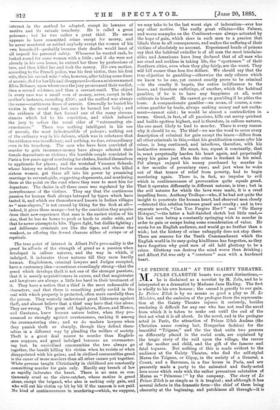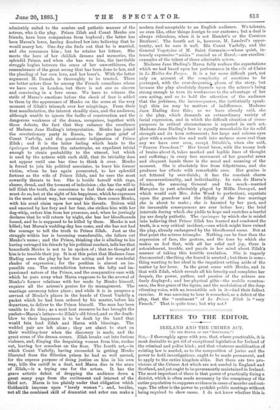"LE PRINCE ZILAH " AT THE GAIETY THEATRE.
MJULES CLARETIE boasts two great distinctions,— • he is disdained as a novelist by M. Zola, and he is interpreted as a dramatist by Madame Jane Hading. The first is wholly to his own honour ; the second is greatly to our gain. Le Prince Zilch is by no means so good a play as M. Le lifinistre, and the omission of the prologue from the representation at the Gaiety Theatre injures it seriously, besides rendering it difficult for any one who has not read the novel from which it is taken to make out until the end of the first act what it is all about. In the novel, and in the prologue acted in Paris, the attraction of Prince Zilah Andras (the Christian name coming last, Hungarian fashion) for the beautiful " Tzigane," and the ties that unite two persons so differently placed in the social scale, are explained by the tragic story of the raid upon the village, the rescue of the mother and child, and the gift of the famous and fatal topazes. But nothing of this is made evident to the audience at the Gaiety Theatre, who find the self-styled Marsa the Tzigane, or Gipsy, in the society of a General, a Count, and a Baroness, in a fine house in Paris, and are presently made a party to the animated and finely-acted love scene which ends with the rather premature salutation of Marsa as " Princesse ! " by the company. The story of Le Prince Zilch is as simple as it is tragical ; and although it has several defects in the dramatic form—the chief of them being obscurity at the beginning, and patchiness all through—it is admirably suited to the sombre and pathetic manner of the actress, who is the play. Prince Zilah and Count Menko are friends, have been companions from boyhood ; the latter has been Marsa's lover, having deceived her into believing that he would marry her. One day she finds out that he is married, and she renounces him ; but he retains her letters. She meets the hero of her childish dreams and memories, the splendid Prince, and when she has won him, the inevitable struggle begins between the sense of her unworthiness, the remembrance of the great wrong that has been done to her, and the pleading of her own love, and her lover's. With the latter argument M. Damala is thoroughly to be trusted. There are better actors than he among the French comedians whom we have seen in London, but there is not one so sincere and convincing in a love scene. We have to witness the strife of Marsa's emotions before the shock of fear is added to them by the appearance of Menko on the scene at the very moment of Zilah's triumph over her misgivings. From their first manifestation, the interest steadily rises, and the audience, although unable to ignore the faults of construction and the dangerous weakness of the drama, recognises, together with those defects, the fact that they enhance the excellence of Madame Jane Hading's interpretation. Menko has joined the revolutionary party in Russia, to the great grief of Count VarlAly, and the passionate indignation of Prince .Zilah; and it is the latter feeling which leads to the hquivoque that produces the catastrophe, an expedient trivial enough to strain probability to the utmost, but which is used by the actress with such skill, that its triviality does not appear until one has time to think it over. Menko is forced to join his political associates, to leave his former victim, whom he has again persecuted, to her splendid fortune as the wife of Prince Zilah, and he uses the most cowardly threats to her. She is beside herself with rage, shame, dread, and the torment of indecision ; she has the will to tell Zilah the truth, the conscience to feel that she ought and must do so, but at the sight of his happiness, which he expresses in the most ardent way, her courage fails ; then comes Menko, with his cruel claim upon her and his threats. Driven wild and unsexed by her fury and her fear, she strikes him with her dog-whip, orders him from her presence, and, when he jeeringly declares that he will return by night, she has her bloodhounds loosed, and he is supposed to be killed by them. Menko is not tilled; but Marsa's wedding-day has come, and she has not had the courage to tell the truth to Prince Zilah. Just as the struggle within her is becoming unendurable, she falters out Menko's name ; and the Prince, thinking she is alluding to his having outraged his friends by his political conduct, tells her that henceforth Menko is not to be spoken of ; that no thought of him is to trouble their joy. It is at this point that Madame Jane Hading saves the play by her fine acting and her wonderful shades of expression ; for the position is almost an impossible one. The contradiction between the lofty and impassioned nature of the Prince, and the comparative ease with which he puts away what Marsa supposes to be the avowal of Menko's former relations with her made by Menko himself, requires all the actress's genius for its management. The marriage ceremony takes place ; and while it is in progress a -aervant of Menko's places in the hands of Count Varhely a packet which he had been ordered by his master, before his departure, to deliver to the Prince himself. The man has been unable to do this ; as a next best resource he has brought the packet—Marsa's letters—to Zilah's old friend, and so the deathblow to their happiness is to be dealt by the hand that would fain load Zilah and Marsa with blessings. The wedded pair are left alone ; they are about to start on their wedding-tour when the discovery is made, and the great scene of the drama occurs. Zilah breaks out into furious violence, and, flinging the despairing woman from him, rushes out, leaving her senseless on the floor. The fourth act,—in which Count Varh6ly, having succeeded in getting Menko liberated from the Siberian prison he had so well earned, for the express purpose of doing justice on him in his own way, kills the caitiff in a duel, and Mania dies in the arms of Zilah,—is a trying one for the actors. It has the grave artistic defect of dropping the audience down a great many pegs from the excitement and interest of the third act. Marsa is too plainly under that obligation which Goldsmith imposes upon "lovely woman " ; and, besides, not all the combined skill of dramatist and actor can make a
modern duel acceptable to an English audience. We tolerate, we even like, other things foreign to our customs ; but a duel is always ridiculous, when it is not Hamlet's or the Corsican Brothers'. The fourth act is, however, M. Landrol's opportunity, and he uses it well. His Count Varliely, and the General Vogotzine of M. Saint Germain,—whose quiet, intensely expressive " asides " remind us of Ravel,—are excellent examples of the talent of those admirable actors.
Madame Jane Ending's Marsa fully realises the expectations which we had based upon her performance in the rule of Claire in Le Maitre des Forges. It is a far more difficult part, not only on account of the complexity of emotions to be portrayed, with the ever-deepeniug. gloom of the story, but because the play absolutely depends upon the actress's being strong enough to turn its weaknesses to the advantage of her own acting, and so to hold the attention of the audience that the jerkiness, the inconsequence, the (artistically speaking) thin ice may be matters of indifference. Madame Jane Ending does this ; as we have already said, she is the play, which demands an extraordinary variety of facial expression, and in which the difficult situation of crosspurposes in critical circumstances is repeated in each act. Madame Jane Ending's face is equally remarkable for its solid strength and its keen refinement; her large and solemn eyes glow with a sombre fire and melt into sadness more real than any we have ever seen, except D6scl6e's, when she said, " Pauvre Frou-frou !" Her broad brow, with the roomy look of brains about it, takes marked and legible lines of thought and suffering; in every free movement of her graceful arms and eloquent hands there is the mood and meaning of the moment. She is absolutely free from fidgettiness. and she produces her effects with remarkable ease. Her genius is not fettered by over-finish ; it has the constant charm of unconventionality, and individuality. In vain do Marsa's friends, the amusing General and the much married Marquise (a part admirably played by Mdlle. Devoyod, and which would snit Mrs. John Wood to perfection), expatiate upon the grandeur and the felicity of the fine marriage she is about to make ; she is haunted by her past, and its inexorable consequences are ever before her; the brief intervals during which she yields to hope and snatches a fearful joy are deeply pathetic. The equivogue by which she is misled into believing that Prince Zilah has learned and condoned the truth, is a very critical incident,—one which might have ruined the play, already endangered by the bloodhound scene. But at that point the actress triumphs. Nothing can be finer than the expression of face, the gesture, and the tone by which she makes us feel that, with all her relief and joy, there is astonishment, trouble, and puzzle in her mind about Zilch's manner of taking this terrible revelation. She is vaguely disconcerted ; the thing she feared is averted ; but there is something wanting to her ideal in the impatient setting aside of the matter by her lover. In the great scene with Menko, and its that with Zilah, which reveals all his ferocity and completes her despair, the power, pathos, and passion of the actress are finely displayed ; and her physical gifts—the mobile countenance, the free grace of the figure, and the modulation of the deep vibrating voice, with an irresistible sob in it—find their fullest exercise. It was amusing to hoar it remarked, as a defect of the play, that the "sentiment" of Le Prince Zilah is "very French." That is quite true; but why not P



































 Previous page
Previous page